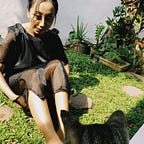'Breast and Eggs' Breaks through the Norm of Femaleness
I always had the impression of how all human beings exist on a spectrum.
It exists in every element of our lives, capable of unlimited combinations of femininity and masculinity. As an individual and as a culture, the more balanced we are, the healthier we are.
'Breast and Eggs' by Kawakami Mieko shows us something that we thought of as an anomaly, something peculiar, even otherworldly.
The story portrays Natsuko, a 30-year-old Osakan writer living on the edge of Tokyo, who receives a two-day visit from her older sister Makiko and her mute 12-year-old niece Midoriko.
In the first half of the novel, Makiko, who works as a hostess in an Osaka bar and is concerned about the effects of aging on her quality as a hostess and travels to the city to look into options for inexpensive breast augmentation. Later on, Makiko's obsession has caused a rift between her and Midoriko, whose diary entries on puberty and sex education. Incapable of comprehending why her mom wants to have a breast implant.
Meanwhile, the second half was set for ten years later in 2017. Natsu procrastinates on her second novel while studying artificial insemination alternatives. Her biggest emotional and practical roadblock is her sexual identity, as she is an asexual woman who rejects the structure of normative pairing. She questions what right she has to have a kid.
Here, portrayed by Mieko Kawakami, the struggle of both sisters with their own femaleness. The quality of being female.
Makiko wants to have breast augmentation for her just to feel something that she lost, her body after giving birth. As what Natsuko concluded from her sister's behavior, she said:
“People like pretty things. When you’re pretty, everybody wants to look at you, they want to touch you. I wanted that for myself. Prettiness means value. But some people never experience that personally.”
― Mieko Kawakami, Breasts and Eggs
As prettiness means value for women, we are once again being approached by the female quality, one of it being their bodily perfection by society's standard. It is said by Whitford (1991) that women's experiences, their cultural, bodily, and sexual differences from men, are celebrated and valorized. They were befitting of the euphoria that Makiko wanted to have.
On the other hand, Natsu wants to break through the norm of having kids through a sexual engagement, and the key is a sperm donation. Asexuality Is defined as the lack of sexual drive or desire.
As an asexual woman, she presented asexuality as a "legitimate" sexual identity and orientation — that is, that asexuality offers a unique series of identifications that together constitute a distinct orientatory outlook on relating, intimacy, and sociality (Pilcher and Whelehan, 2004).
Poet Cameron Awkward-Rich announces asexuality rarely heard or articulated (A Prude's Manifesto, 2015). In this case, mostly true. As the character with asexual tendencies herself, even Natsuko is confused with her own approach to her sexuality.
Masculinity (maleness) and femininity (femaleness) are societal constructs, not biological sex or sexual orientation. But here, Natsu is questioning her value as a woman and as a mother. Is it acceptable to have a kid without a proper father and any sexual approach to it?
She is having a dilemma and choose a way to isolate her actual thoughts from other, experiencing a denial. As Natsu begins to question her life as a single woman scouring sperm donation while living in a culture where that act is far from the norm, it all turns into emotional outbursts that are frequently linked to some kind of gender definition.
Regarding the emotional outburst, once again, she's faced with her own female qualities. As Deng Y, Chang L, Yang M, Huo M, and Zhou R (2016) said that some studies have indicated that women have greater up-regulation of emotional responses to negative stimuli, which means that they often compound negative emotions.
Natsu's world is up and down. Meanwhile, she can break free from the norm regarding her sexual qualities as a female. Ela Przybylo (985) said sex is a promise unevenly distributed, and its salutary qualities are most frequently granted to white, middle-class, able-bodied, and heterosexual populations, which are understood as socially valuable.
Natsu is defined as a heterosexual and develops emotion toward the opposite sex but not in a sexual way, which makes her breakthrough the worldview of femaleness as in it's normal if women aren't happy having their body parts pleasured.
As we dive in more, we are approached by the intensity of these two characters struggling to do what they really want and what is right for them.
Meanwhile, I think these two characters are being swayed by their own quality and standard of being a woman, and I'm impressed by how they grow as women and as human beings.
In the end, breaking through our own boundaries isn't really a simple thing. But once you break free, you can embrace the peace of mind.
Last thing from the book:
“Yeah, my mum was free labor — free labor with a pussy.”
― Mieko Kawakami, Breasts and Eggs
